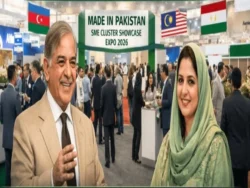Curtain rises on five-year plan for economic revival
15 March 2024
Published in: DAWN
In an attempt to stabilise the nation’s faltering economy, the newly elected government has embarked on crafting a detailed five-year strategy aimed at rejuvenating key economic sectors.
In this regard, Prime Minister Shehbaz Sharif chaired a high-level meeting on Thursday, laying down a comprehensive roadmap for the country’s economic resurgence over the next half-decade. This strategic blueprint will focus on critical areas such as curbing inflation, alleviating poverty and creating jobs.
“In the first meeting, the prime minister sought estimates from different ministries and divisions and formed a committee to go back to the ministries to set five-year targets in different sectors, such as IT, agriculture, industries, energy, food and livestock, reforms in FBR (Federal Board of Revenue), ease of doing business, etc,” Minister of State for IT Shaza Fatima Khawaja told Dawn after the meeting.
Ms Khawaja, who attended the meeting, said the committee, after getting the required information from the ministries and divisions, would prepare a consolidated document carrying five-year targets for all sectors. She said several meetings would be held soon on the five-year roadmap.
Earlier, speaking at the meeting, the prime minister said consultation should be held on the plan with all stakeholders of different sectors of economy.
“Without wasting any time, implementation of projects for the economic stability and progress of the country should be ensured,” PM Shehbaz said, according to an official statement issued by Prime Minister Office (PMO).
The prime minister said a schedule of implementation for the projects should be presented and steps should be taken on a priority basis to speed up progress in the sectors of agriculture, livestock, information technology, foreign investment and small and medium (SME) enterprises.
He said the government would reduce its expenditure and he would not allow “further waste of money of poor people”.
“In the next five years, the country’s economy would be stabilised to put the country on the path of progress,” he hoped. The prime minister said tax revenue would be increased with digitalisation and technology, while per-acre yields in the agriculture sector would also be increased with the use of technology. The loss-making government institutions would be privatised on a priority basis, he added.
The meeting was informed in detail about the roadmap for economic progress and about proposed measures in important sectors, including electricity, agriculture, livestock, exports, small and medium enterprises, taxes, information technology, small and medium enterprises, investment, and privatisation.
Cabinet members Ahsan Iqbal, Muhammad Jehanzeb, Ahad Khan Cheema, Dr Musadik Malik, and high-ranking officers attended the meeting.
Earlier, Federal Minister for Maritime Affairs Qaiser Ahmed Sheikh reiterated Prime Minister Sharif’s commitment to Pakistan’s rapid development and asked the opposition parties to work with the government to provide relief to the common man.
Direct subsidy to farmers
The government has also decided to scale up free Danish Schools model across the country, provide direct fertiliser subsidies to farmers instead of highly misused gas-based concessions to fertiliser manufacturers and set a minimum benchmark for commercial banks to extend loans to SME-based industrial parks.
Minister for Petroleum and Energy Musadik Malik told journalists on Thursday that the prime minister had also decided to bring down political and social tension in the country.
“In such a tense situation, even a house cannot run, let alone a country,” he said, adding that “we need to show tolerance while maintaining differences so that a tolerant future could be given to a growing population”. However, he did not spell out the required measures in this regard.
The prime minister, he said, had prepared a couple of sectoral strategies for agriculture, education, SMEs’ promotion and energy transition to cheap and green energy. He said that under the agriculture strategy, farmers in rural areas would be provided direct subsidy so that they could arrange fertilisers. This would be a departure from the existing subsidy regime that provides cheap gas to manufacturers, who pass on the benefit to farmers only partially and keep the remainder with them to earn profits.
Likewise, farmers in rural areas would be provided quality seeds directly through world-renowned producers for increased productivity to remove middlemen and monopolistic seed companies charging heavy costs to consumers. On top of this, these farmers would be facilitated in operating their tube wells on solar energy.
Mr Malik said that the combination of three steps — direct fertiliser subsidy, supply of quality seeds, and solar-powered tube-wells — would help materialise a green revolution in the country as their productivity would triple in a couple of years. The programme would be scaled up every year, he said.
Secondly, the government would facilitate small industrial parks for small and medium businesses for perishable food items, as 30 to 35 per cent fruit, vegetables and other perishable items get lost without reaching the market.
Banks would be strictly required to extend loans to these SMEs so that small businesses of local produces flourish and upgrade the living conditions of not only the farmers but also others related to the value chain.
In a similar scheme for urban areas, banks would be required to lend to small businesses so that young and skilled workers start their own businesses, grow and create jobs. The banks would be bound to give these SME businesses a certain percentage of their deposits.
Likewise, 500,000 youngsters in urban and rural areas would be trained through specialised eight- to 12-week bootcamps in artificial intelligence and machine learning.
In yet another move, all the oil and gas companies have been asked to set up their subsidiaries for renewable energy projects to create a new renewable energy marketplace for energy transition to green energy. This measure is expected to help reduce energy costs in future.
Mr Malik said the prime minister had also decided to make available funds for all those students of any education stream who could secure their admissions to international universities. They would not be deprived of foreign education just because of finances, provided they were talented enough to secure positions in well-known global universities.





